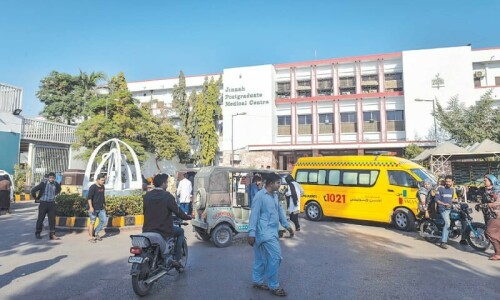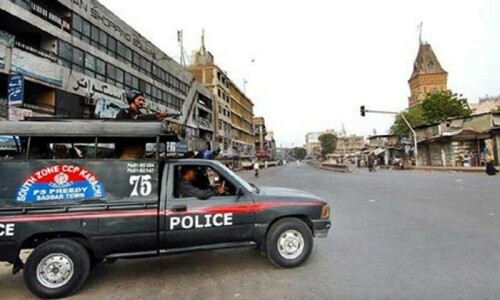KARACHI: Trials of over 5,000 drug-related cases hit a snag as the federal government has failed to increase the number of special courts in the metropolis to try the suspects and punish the convicts booked under the anti-narcotics law, it has emerged.
Well-placed sources told Dawn that more than 5,000 drugs cases were recently transferred from the two Special (Control of Narcotic Substance - CNS) Courts to 12 Model Criminal Trial Courts (MCTCs) functioning in Karachi.
In Sindh, there are only two special CNS courts established in Karachi, which were supposed to decide hundreds of drugs-related cases filed by the federal and provincial law enforcement agencies all over the province.
In order to lessen the burden of workload on the CNS courts, the sources said, the Sindh High Court Chief Justice Ahmed Ali M Sheikh had in March this year ordered transfer of those cases from the CNS courts, which had been filed by the provincial law enforcement agencies, including the Sindh police and the excise police. Therefore, more than 5,000 cases (around 2,600 each from the CNS-I and II) were transferred to the 12 Model Criminal Trial Courts — two each functioning in South, East, West, Central, Korangi and Malir districts — over the period of three months under the directives of the high court.
The hold-up results in destruction of evidence leading to acquittal of accused
“At the moment there are hardly 800 cases left with the CNS-I and II which are originally mandated to entertain only the cases filed by federal agencies — the Anti-Narcotics Force, the Pakistan Customs, the Pakistan Coast Guards and the Pakistan Railways”, the judicial staffers told Dawn.
But, the sources said that the transfer of over 5,000 cases from the CNS courts had put an extra burden on judges of the MCTCs, which had been preoccupied with extra cases.
Sessions’ courts overburdened
“The model courts have received an average 500 extra cases each in addition to a large number of cases already assigned to them,” said the judicial sources requesting anonymity.
Therefore, the judicial sources said that SHC CJ Shaikh had recommended to the federal government to delegate special powers to at least 12 more courts in the metropolis to decide the recently transferred drugs-related cases under the CNS Act, 1997.
The judicial and prosecution sources said that the federal government had yet to decide the provincial top judge’s recommendation primarily because of the change in the mechanism for the appointment of judges/delegation of special powers to the ordinary sessions’ courts following a judgment rendered by the Supreme Court of Pakistan in the Mustafa Impex Case back in 2016.
“Earlier, the Prime Minister and Chief Minister(s) concerned were the sole authority to approve summaries moved by either by the federal law ministry or provincial law department(s) seeking establishment of new courts or conferring special powers to the existing ordinary sessions’ courts”, said the sources.
“However, following the apex court’s judgment the federal and provincial cabinets, including the Prime Minister, the Chief Ministers and Ministers, would jointly deliberate upon and decide such summaries seeking establishment of new courts/conferment of special powers to the existing ordinary sessions’ courts to decide the cases lodged under the special laws such as the CNS Act, Anti-Terrorism Act etc”.
Delayed trial benefit accused
The lawyers opined that the trials were stalled for the last three months causing problems for the suspects booked in these cases.
“In the first place, this is a violation of the fundamental rights of speedy trial of every suspect(s)”, they said.
Secondly, they said that such delays would ultimately benefit the accused persons, as it results in non-recording and destruction of the crucial evidence — both material as well as the testimonies of the witnesses — resulting in their acquittal.
“This would ruin the whole concept of conducting swift trials to punish the accused involved in the dirty business of drugs”, added the lawyers.
Published in Dawn, August 15th, 2022













































Dear visitor, the comments section is undergoing an overhaul and will return soon.